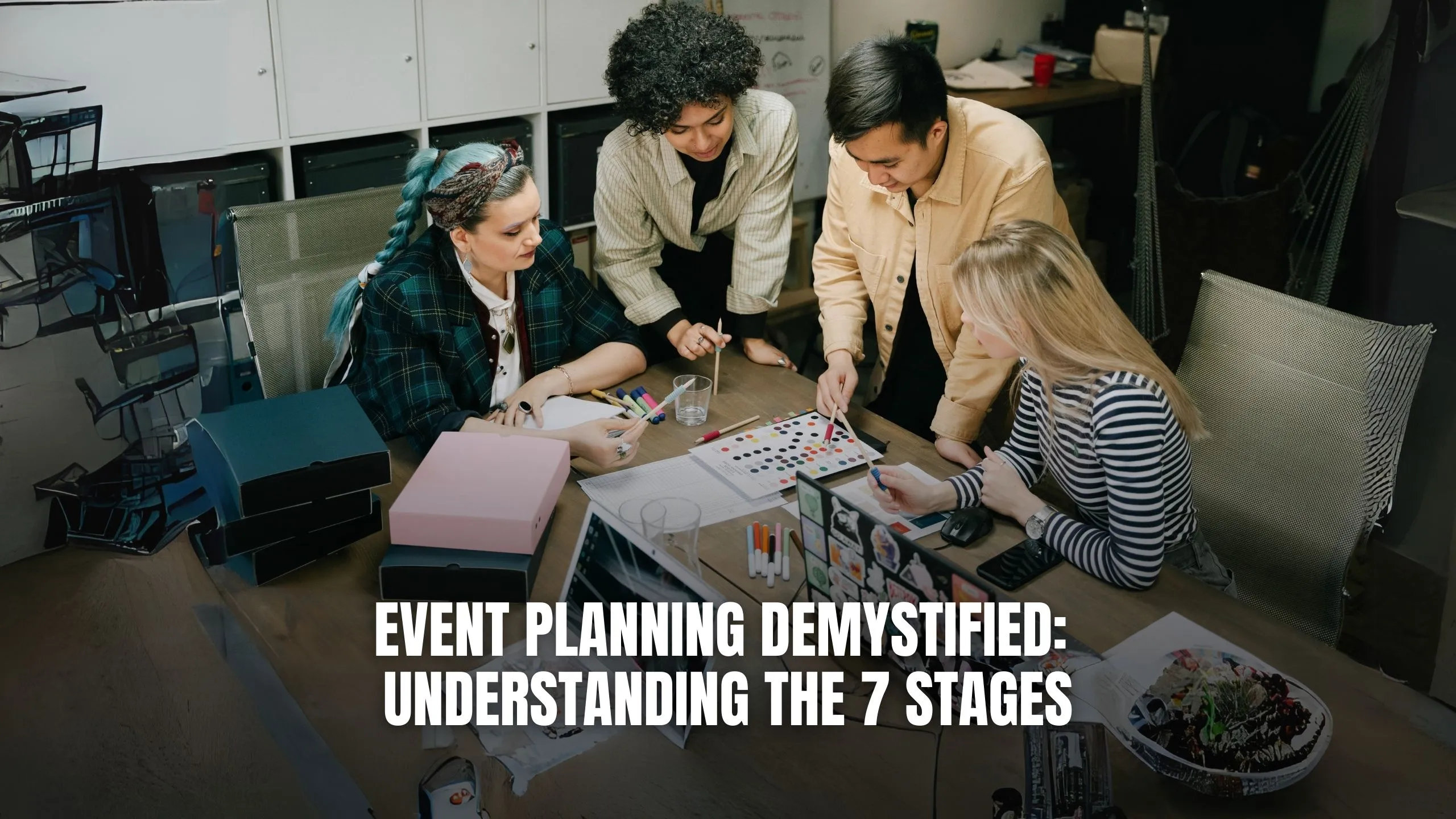Event Planning Demystified: Understanding the 7 Stages


Event Planning Demystified: Understanding the 7 Stages
Planning an event involves a series of intricate steps, each crucial for ensuring its success. From conceptualization to execution, understanding the seven stages of event planning is essential for orchestrating memorable experiences. In this blog, we’ll delve into each stage, unraveling its significance and providing insights to demystify the event planning process.
1. Conception and Ideation
The journey begins with conception and ideation, where the event’s purpose and objectives are defined. This stage involves brainstorming ideas, setting goals, and outlining the event’s scope and theme. Tools like Trello facilitate collaboration among team members, allowing them to organize ideas and tasks effectively.
2. Research and Planning
Research and planning are pivotal for laying the foundation of a successful event. This stage involves scouting venues, securing vendors, and creating a comprehensive budget and timeline. Platforms like Eventbrite simplify event planning by offering tools for ticketing, registration, and promotion, streamlining the planning process.
3. Design and Coordination
Design and coordination focus on bringing the event’s vision to life through creative elements and logistics. This stage entails designing layouts, selecting decor, and coordinating with vendors to ensure seamless execution. Tools like Canva empower planners to create stunning visuals and marketing materials, enhancing the event’s aesthetic appeal.
4. Promotion and Marketing
Promotion and marketing play a crucial role in driving attendance and generating buzz around the event. This stage involves crafting compelling messaging, leveraging social media, and implementing targeted advertising campaigns. Platforms like Buffer enable event planners to schedule posts, analyze engagement, and optimize their social media strategy for maximum impact.
5. Execution and Logistics
Execution and logistics are where all the planning comes to fruition. This stage involves managing vendors, coordinating staff, and overseeing the event’s operations in real-time. Tools like Slack facilitate communication among team members, ensuring smooth coordination and quick problem-solving during the event.
6. Feedback and Evaluation
Feedback and evaluation are critical for assessing the event’s success and identifying areas for improvement. This stage involves gathering feedback from attendees, sponsors, and stakeholders, and analyzing key metrics such as attendance and revenue. Platforms like SurveyMonkey make it easy to create surveys and collect valuable insights to inform future events.
7. Post-Event Wrap-Up
The final stage involves wrapping up loose ends and documenting key learnings from the event. This includes finalizing financial reports, sending thank-you notes to participants, and debriefing with the event team. Tools like Google Drive provide a centralized platform for storing documents and collaborating on post-event tasks, ensuring nothing falls through the cracks.
Recommended Saas Products:
- Trello: Collaborative project management tool for organizing ideas, tasks, and workflows efficiently.
- Eventbrite: Event management platform for ticketing, registration, and promotion, simplifying the planning process.
- Canva: Graphic design tool for creating stunning visuals and marketing materials effortlessly.
- Buffer: Social media management platform for scheduling posts, analyzing engagement, and optimizing marketing strategies.
- Slack: Team communication tool for seamless collaboration and quick problem-solving during events.
- SurveyMonkey: Online survey platform for gathering feedback and insights from event attendees and stakeholders.
- Google Drive: Cloud storage and collaboration platform for storing documents and facilitating post-event tasks effectively.
Conclusion
Understanding the seven stages of event planning is essential for orchestrating successful events that leave a lasting impression. By following a systematic approach, event planners can navigate each stage with confidence, ensuring every detail is meticulously executed. With the right tools and strategies at their disposal, planners can create memorable experiences that exceed expectations.
Unlock Secret Deals and Save Big
Ready to streamline your event planning process and unlock exclusive deals on essential tools? Sign up for free with Subscribed.fyi to access savings on 100+ SaaS tools, including event planning software and productivity platforms. Take control of your event planning journey and maximize your efficiency with Subscribed.fyi!
Relevant Links:








